Syrian soldiers on the Latakia Front finally taste the fruits of victory – but they know Isis is not dead
Can Syria be put back together again? Its army is in the habit of talking again about a future state with all its borders intact
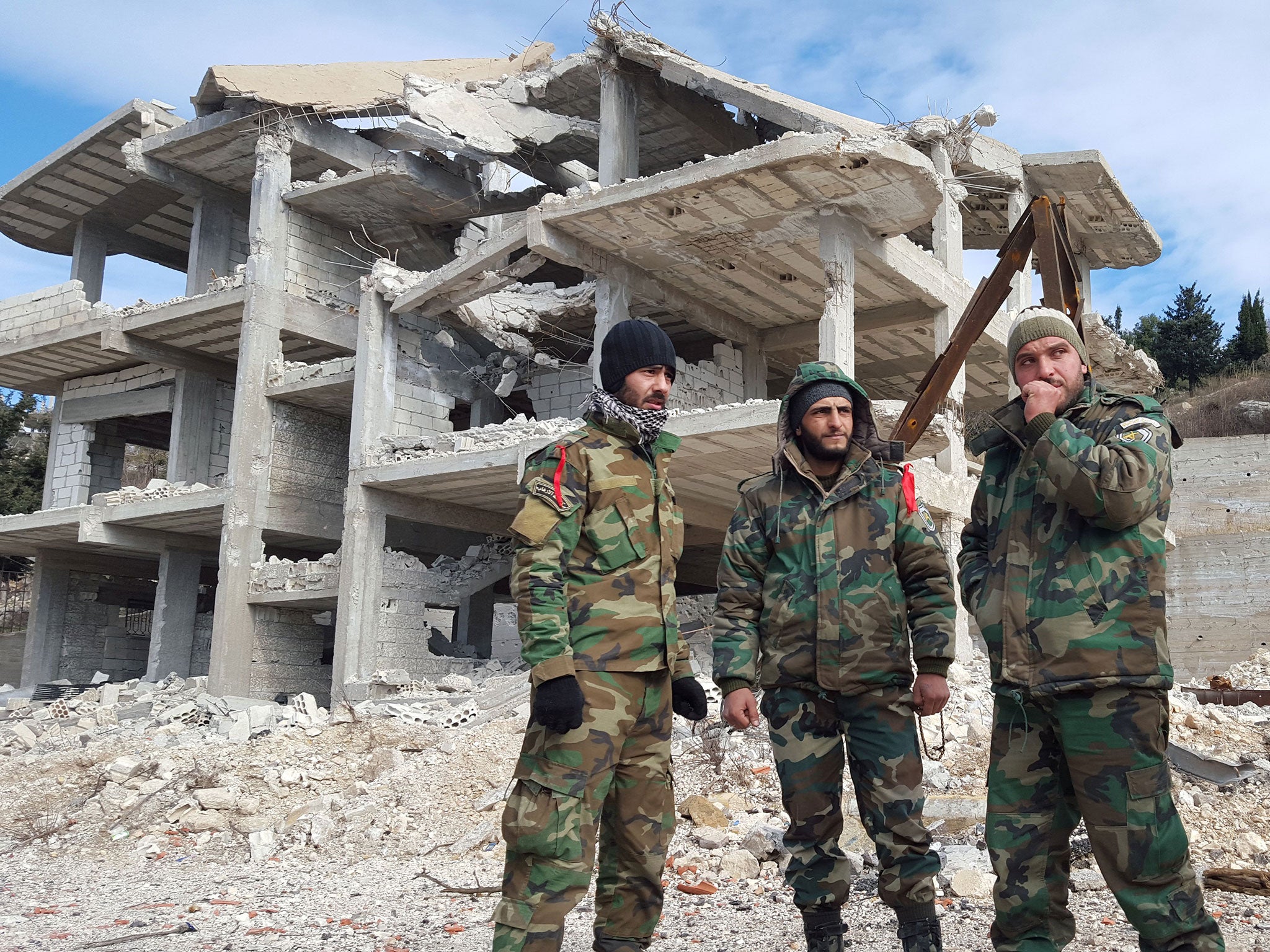
Along the Syrian army gun line, they are firing their 130mm artillery out of the wooded valleys south of Kassab, the guns invisible amid the hot orchards and the dark trees.
And from the smashed village of al-Rabiaa – newly taken by the Syrian army from the retreating rebels of Jabhat al-Nusra – you can watch the shells exploding across the valley, a great curtain of blue smoke that ascends into the heavens just this side of the Turkish border.
The guns whack out their shells every 30 seconds and they soar over us and, six seconds later, you can see the impact of their explosions through the heat haze. A Syrian colonel watched all this with satisfaction. “You can just imagine how angry the Turks are,” he muttered. Too true.
The Russian Sukhois had done fierce damage to the Nusra bases, houses – the names of the “Nusrah front”, the “Army of Islam”, the “Ahrar al-Sham”, still spray-painted on what was left of their walls – blown apart by their missiles. Roads had been torn up, trees ripped apart, their huge trunks lying down the hillsides like giant skittles. And now the soldiers of what the Syrian army calls its Latakia Front sit on the grass by the roadside and brew tea, waving and smiling and – for the first time in years – tasting the fruits of victory.
Their field commander, a 50-year-old grey-haired general from Hama dressed in a black sports hat, a brand new Russian camouflage smock – “a gift from our friends,” he called it – and black boots, showed no hesitation in thanking the Russians. “Our honest friends showed how they stood with the Syrian army to fight terrorism,” he said. “They provide us with our cover in the field and on the ground. But air support doesn’t liberate land if there are no soldiers on the ground.”

Well, he could tell that to the American pilots in Iraq, couldn’t he, the pilots who have supposedly battered Isis over and over again for months but whose Iraqi allies seem incapable of advancing. Not so in northern Syria, where Syrian troops are moving rapidly eastwards in new Russian-made army trucks under Moscow’s air cover along the Turkish frontier from the old Syrian-Turkish border post at Kassab. The al-Nusra forces are clinging to this side of the frontier in what Syrian officers suspect is an attempt to provoke Syrian artillery to fire shells into Turkey itself – which the Syrians claim they have not done. Indeed, the field commander insisted that the Turks had fired into Syria and inflicted wounds on his own men.
It was, as we used to say in the old days of journalism, the first time a Western correspondent had visited this corner of the Syrian war since the Russians began air operations against the rebels. And it raised a host of intriguing questions. How was it, for example, that right next to the Turkish frontier post at Kassab, two spanking new roads lead from the Turkish side of the border into Syria?
The Syrians say that these roads – almost identical to those the Israelis used to build just inside the Lebanese frontier – were constructed by the Turks specifically for Nusra fighters to cross the frontier illegally, that the Turkish military not only tolerated but helped to build these little concrete highways down the hill into Syria.
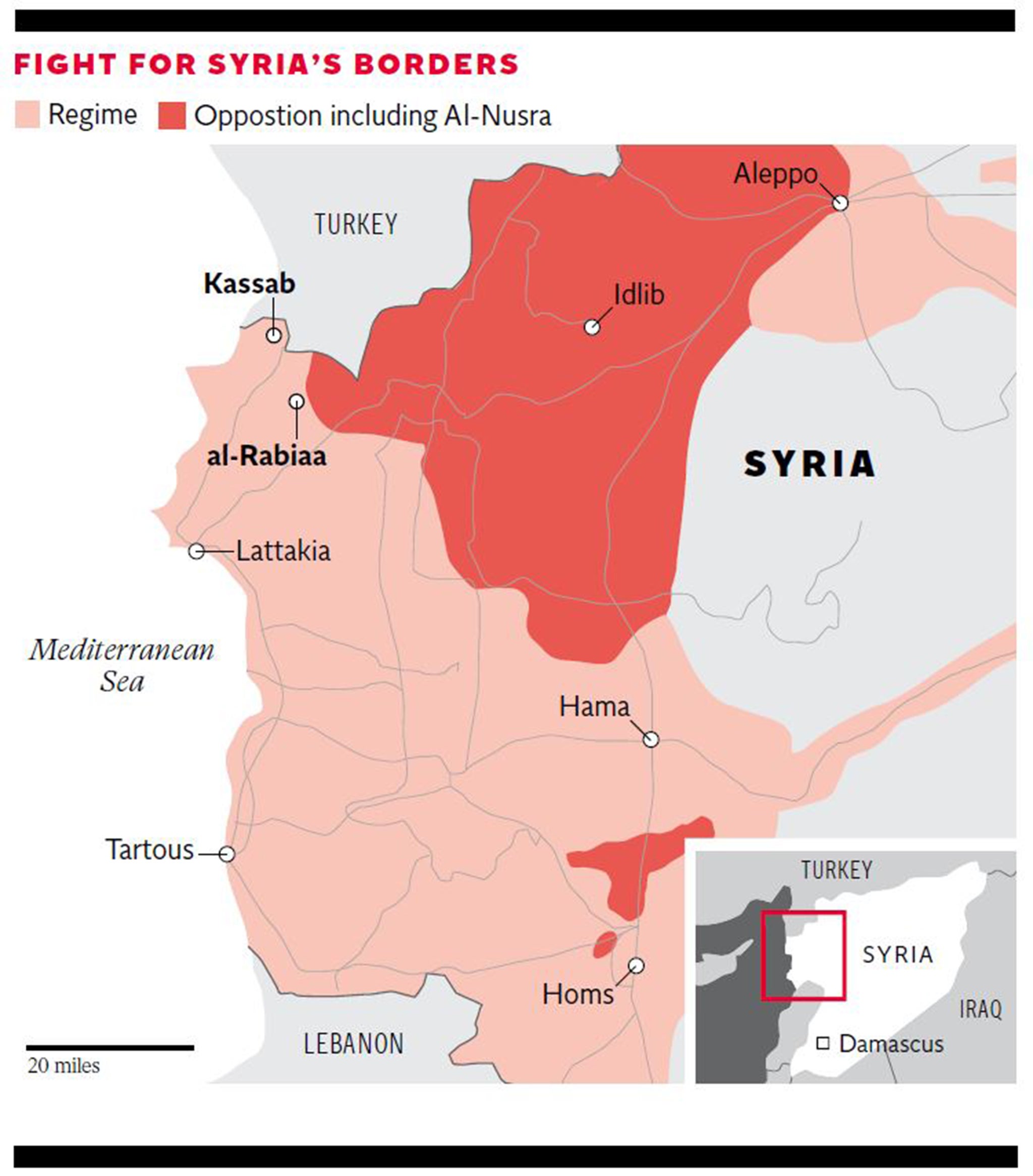
And what else should one suppose when, in front of my own eyes, a small Turkish military patrol including an open truck of Turkish troops blithely passed the two new roads which are blocked by neither fences nor concrete blocks? A bunch of Syrian military intelligence men now live inside the Syrian post, although they have not yet painted over the rebel names that also litter the outside walls. Behind the border, you can see the white crescent-on-red of the Turkish flag.
But an intriguing tale is told of the recapture of the Syrian border post; of how former “Free Syrian Army” units – reincorporated into the Syrian army after their original desertion – were given the “honour” of carrying out the operation, of how two of their groups overwhelmed the Nusra men and restored Syria’s sovereignty on the northwest corner of its territory. The narrative, needless to say, tells a lot about the Syrian army’s portrayal of the “moderates” Messers Cameron and Obama like to talk about, although we must suppose that the infamous “fog of war” may cover all these exploits, at least until we have time to investigate the reality.
I walked up to the Turkish border post. “Welcome to Turkey,” a signpost said in Arabic, English, German and French, but there was no welcoming to be done. When I peered below the Turkish border guard offices, I saw only the bust of a man – thus was I met by the grim stare of Mustafa Kemal Ataturk.
And indeed, the founder of the Turkish state would have much to be grim about. The Syrians are now making their way along the frontier which – scarcely two weeks ago – the Turkish army threatened to invade. Across the bare surface of Dahih mountain, you can see the Syrian army’s tents pitched in lazy profusion. It was just after the capture of this hill, only a few hundred yards from a concrete Turkish police post, that the Turkish airforce shot down Russia’s Sukhoi bomber and set off the latest crisis in Russian-Turkish relations.
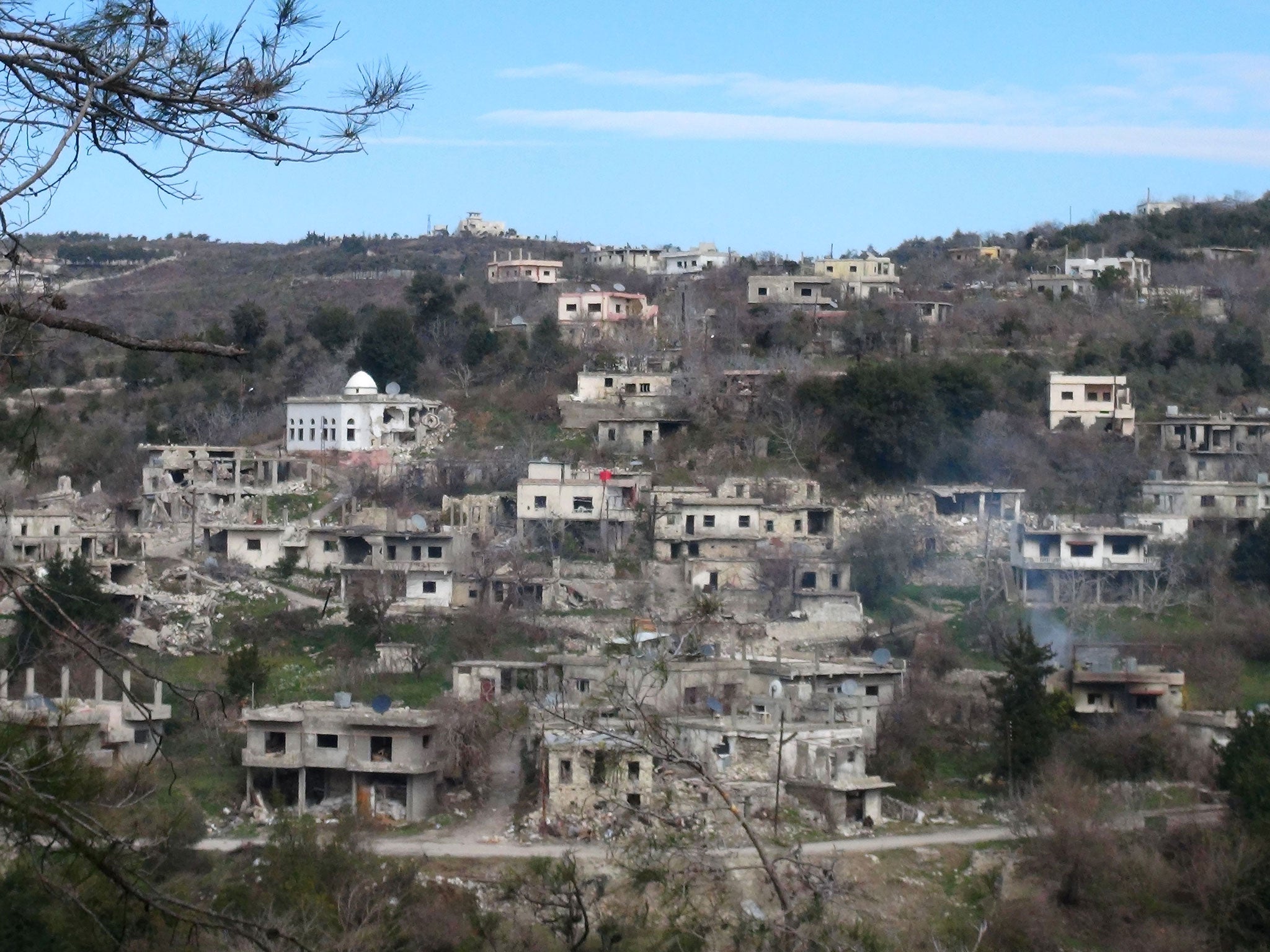
“Turkish revenge for our victory on the mountain,” the Syrian soldiers chorus. “The Turks must be going mad,” one of their colonels said. The wounded Russian crewman who was rescued after his plane crashed returned to duty at the big Russian air base at Latakia on the Syrian coastline just four days ago.
In hours of travelling along twisting mountain roads, past streams and lakes that are so reminiscent of Bosnia, I saw no sign of any Russian military personnel. There are plenty of Russians in western T-shirts in the big Afamia hotel – along with a six-man Moscow TV crew – in Latakia. And the Sukhois roar deafeningly over the main coastal highway, while off the coast of Tartous a large Russian warship moves like a ghost behind the sea fret two miles offshore. But this is no Afghanistan – not yet – and if Russian air controllers have personnel on the ground with Syrian troops, I did not see them.
Nor did I see any civilians in the wreckage of the villages across the Turkmen mountain. For these were Turkmen homes, most – though by no means all – supporters of whoever Turkey helped in the war against Bashar al-Assad’s regime in Damascus. Some have fled as refugees to Latakia itself; many others must have joined the refugee trek towards the Turkish border. The Syrians say they have buried all the dead Nusra fighters they found – no figures available, of course – and with Islamic rites (also, “of course”), but there must be other human beings dying across the valleys as the distant thump of shells echoes back to the Syrian army.
Indeed, it is a little disturbing to gaze across this haunted landscape with its ruined villages and the smell of unpicked oranges and the distant white and grey smoke blossoming on the opposite hillside because you must remind yourself that the war goes on, that victories – however successful and however committed the Kremlin may be – do not finish because one army breaks a cocktail of Islamist rebels along the Turkish frontier.
Many of the houses around al-Rabiaa appear to have been peppered by shrapnel from Russian air bombing and unexploded artillery and mortar ordnance lies across the fields. In one wrecked village, we had to veer sharply to the right to avoid an unexploded Grad missile, fired by Nusra, which had embedded itself, all grey steel and wires, in the middle of the street.
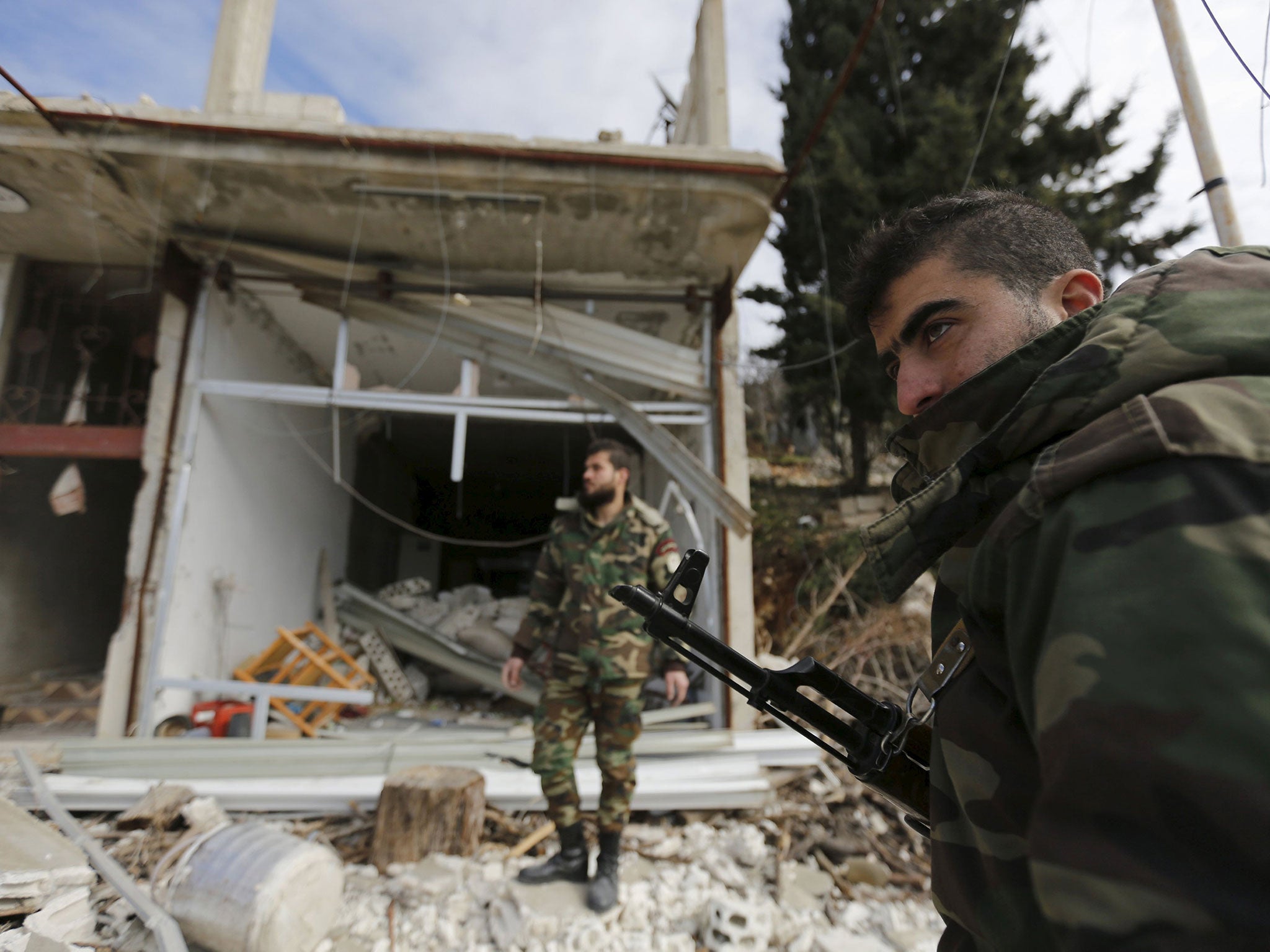
The Syrians themselves like to emphasise that their enemies are all foreigners – Turkmen from Turkey and Turkmenistan, Uigurs from China, civilians from Kyrgyzstan, although they know that Syrians, too, are out there across the valleys. “The Turks are spectacularly unhappy,” another officer said – he knew how clever his expression was in English – and expressed the view that “the Turks never expected the Syrian army would reach this point. They never guessed our strength and they know that their project here in Syria [the destruction of the regime] is collapsing.
“The Russians were very big here. They were very important, and I say this as a soldier on the Latakia front. But as you can see from the terrain – the mountains and rivers – this is a very complicated area for the military and the role of aircraft was less important as we fought our way through the valleys.”
Several officers spoke of a senior Turkish officer killed by Syrian shelling over the past few months – they name him as Major General Shahin Hassrat, who was supposedly at a meeting of Nusra fighters when the Syrian army targeted the building in which they had agreed to rendezvous. You can see the confidence of the Syrians now, walking up on to the hillsides to watch their own artillery bombardment, heedless of snipers.
But perhaps they know more than we do. Nusra has scarcely fired a mortar back at its enemies. No one stopped us filming the Syrian armour and the gun batteries standing beside the mountain roads. Indeed, there were several self-propelled guns whose sparkling camouflage paint and stylish, hull-clinging gun barrels suggested more gifts from Moscow had recently been arriving here.
As for the general, he wished – like almost the entire government of Syria – to implicate Turkey in the “terrorist” attempts to destroy Syria. “The Turks actually brought Uigurs here and Turkmenistan people – with their families – to settle them here. This was their project. Our soldiers are now advancing right along the frontier wire and every advance forward squeezes the terrorists Turkey directly supports. And everyone who stands with us” – the general was talking about the Russians – “we are very grateful to.” And he went on to say that Syria was the land of “all peoples”, that the purpose of the “terrorists” and the Turks was to “sectarianise” the war. “We are a mosaic, our country comprises lots of nationalities – this is the secret of Syria.”
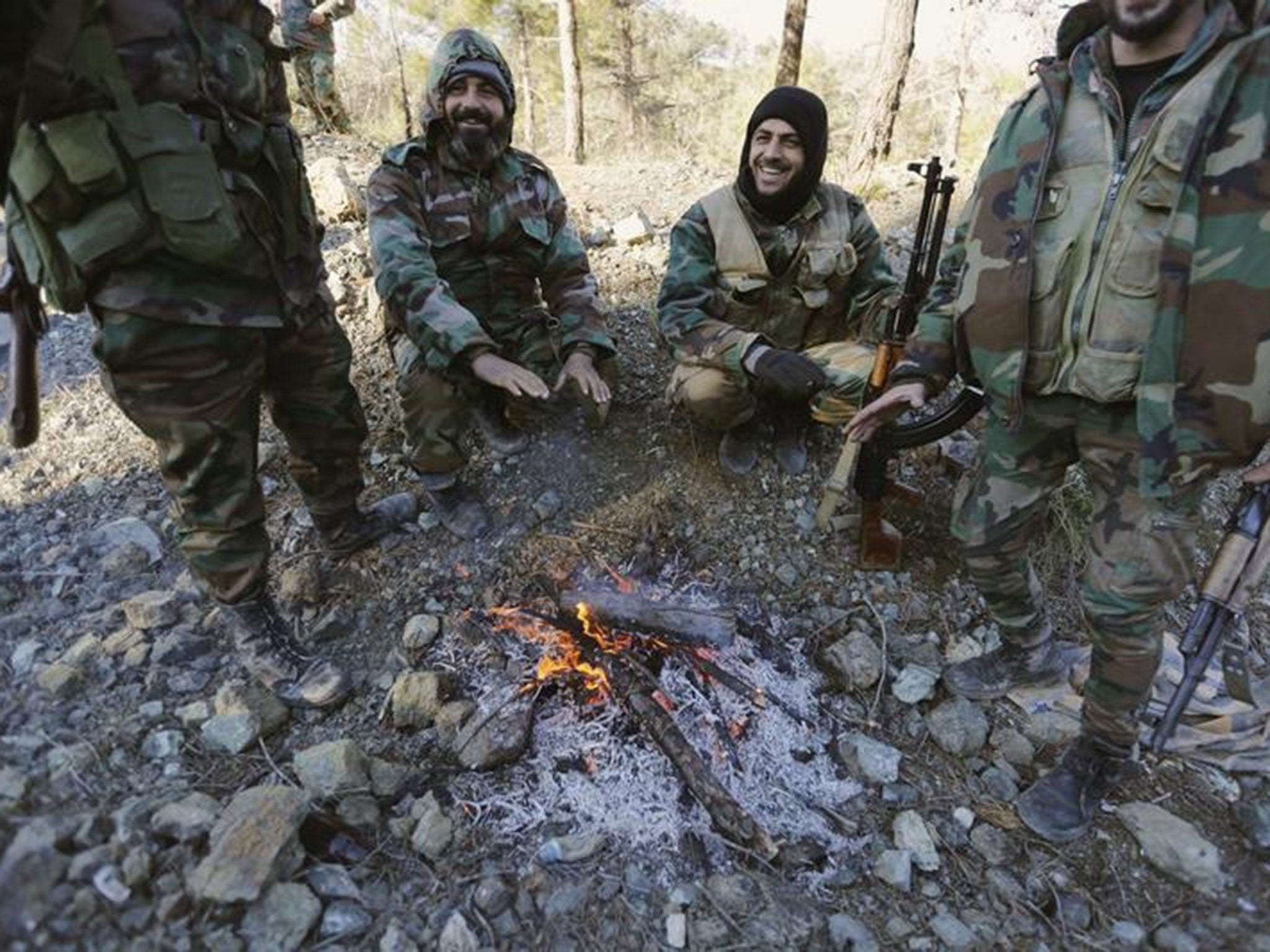
But can Syria be put back together again? The Syrian army is in the habit of talking again about a future state with all its borders intact, with the Isis capital of Raqqa again under its control and – of course – with President Bashar al-Assad as “the guarantee of the stability of Syria”. I pointed out to the general that he wore no identification or badge of rank on his Russian-made camouflage smock, and suggested that – unlike Admiral Nelson – he preferred not to make himself a target for snipers. He knew the story of the French sniper in the rigging. “Liberating our land is the most important medal we can wear,” he replied.
But how much of Syria can be liberated? What do the Turks now have up their sleeve? And Saudi Arabia? And Qatar? And Russia? And, indeed, what of Nusra and the various outfits that clung around al-Qaeda, some of whom – far to the east – transmogrified into Isis? There was no “Free Syrian Army” graffiti on the walls around al-Rabiaa, which suggested that David Cameron’s 70,000 “moderate” ghost soldiers did not cut much ice here.
But Isis is not dead. The Syrians know this as well as anyone, not least because they have real “boots on the ground”, and know after almost five years of fighting that the cult which still rules far away in Raqqa has a fearful habit of striking back.
Bookmark popover
Removed from bookmarks